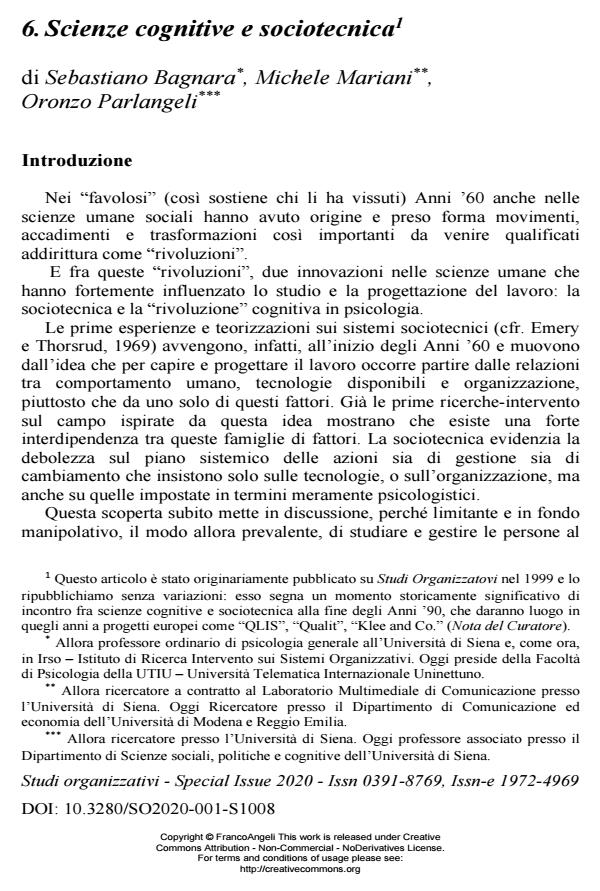Scienze cognitive e sociotecnica
Titolo Rivista STUDI ORGANIZZATIVI
Autori/Curatori Sebastiano Bagnara, Michele Mariani, Oronzo Parlangeli
Anno di pubblicazione 2020 Fascicolo 2020/suppl. 1 Lingua Italiano
Numero pagine 16 P. 126-141 Dimensione file 267 KB
DOI 10.3280/SO2020-001-S1008
Il DOI è il codice a barre della proprietà intellettuale: per saperne di più
clicca qui

FrancoAngeli è membro della Publishers International Linking Association, Inc (PILA)associazione indipendente e non profit per facilitare (attraverso i servizi tecnologici implementati da CrossRef.org) l’accesso degli studiosi ai contenuti digitali nelle pubblicazioni professionali e scientifiche
- Ackerman M.S., Malone T.W. (1990). “Answer Gardner: A Tool for Growing Organizational Memory”, Proceedings of the Conference on Office Automation Systems, Cambridge (MA): ACM.
- Anderson J.R. (1987). “Methodologies for Studying Human Knowledge”. Behavioral and Brain Sciences, 10: 467-505.
- Bagnara S. (1990). Ergonomia cognitive e interazione uomo-calcolatore. In: Gilli D., Grimaldi F. (a cura di). Interazione col computer e sistemi formativi, Milano: Franco Angeli.
- Bagnara S., Broadbent S. (1990). “Ergonomia degli artefatti cognitivi”. Quaderni di sociologia, 4: 105-123.
- Bagnara S., Rizzo A. (1990). Mental Fatigue, Work Experience and Cultural Factors in Technology Change and Transfer. In: Berlinguet L., Berthelette D. (eds.). Work with Display Units. Amsterdam: New Holland.
- Brown J.S., Duguid P. (1991) “Organisational Learning and Communities of Practice: Toward a Unified View of Working. Learning and Innovation”. Organisation Science, 2/1: 40-57.
- Butera F., Koehler E., Di Martino V. (1989). Techological development and the improvement of living and working conditions. London and Bruxelles: Kogan Page & EEC Official Publications.
- Butera F. (1995). “Designing Advanced Sociotechnical Systems for and through the Empowerment of the Person. The Conceptual Framework of Qualit Esprit Project”, Proceedings of the IFAC Symposium on Automated System Based on Human Skills, Berlin, September 25-28.
- Butera F., Donati A., Cesaria R. (1997). I lavoratori della conoscenza Milano: FrancoAngeli.
- Carroll J.M., Orson M.B. (1986). Usability Specifications as a Tool for Iterative Development. In: Hartson H.R. (ed.). Advances in Human Computer Interaction, Vol. 1. Norwood (NJ): Ablex.
- Clegg C. (1994). “Psychology and Information Technology: The Study of Cognition in Organisations”. British Journal of Psychology, 85: 449-477.
- D’Andrade R. (1981). “The Cultural Part in Cognition”. Cognitive Science, 5: 179-185.
- Davis L.E., Cherns A.B. (1975). The Quality of Working Life. New York: Free Press.
- Emery F., Thorsrud F. (1969). Form and Contest of Industrial Democracy. London: Tavistock Publications.
- Hick W.E. (1952). “On the Rate of Gain Information”. Quarterly Journal of Experimental Psychology, 4: 11-26.
- Hutchins E. (1995). Cognition in the Wild. Cambridge (MA): MIT Press.
- Lave J. (1991). Situated Learning in Communities of Practice. In: Resnick L.B., Levine J.M., Teasley S.D. (eds.): Perspectives on Socially Shared Cognition, Washington, D.C.: APA.
- Maltzahn C., Vollmar D. (1994). “Toolbox: A Living Directory for Unix Tools Owned by the Community”, Technical Report CU-CS-747-94, University of Colorado at Boulder.
- Merton H.C. (1997). “A Look at Factors Affecting the Quality of Working Life”. Monthly Labour Review, 100 (10).
- Nardi B.A. (a cura di) (1995). Contest and Consciousness: Activity Theory and Human-computer Interation. Cambridge (MA): MIT Press.
- Neisser U. (1967). Cognitive Psychology. Englewood Cliffs (NJ): Prentice Hall (trad. it.: Psicologia cognitivista, Firenze, Martello-Giunti).
- Norman D.A. (1988). The Design of Everyday Things. New York: Basic Books (trad. it.: La caffettiera del masochista, Firenze, Giunti, 1990).
- Norman D.A. (1991). “Artefatti cognitivi”. Sistemi intelligenti, 3: 453-476.
- Norman D.A., Draper S.W. (eds.) (1986). User Centered System Design: New Perspectives on Human Computer Interaction. Hillsdale (NJ): Lawrence Erlbaum Associates.
- Norman D.A., Shallice T. (1985). Attention to Action: Willed and Automatic Control Behavior. In: Davidson R.J., Schwartz G.E., Shapiro D. (eds.). Consciousness and Self Regulation: Advances in Research, Vol. IV. New York: Plenum.
- Reason J.T. (1987). Framework Models on Human Performances and Error: A Consumer Guide. In: Goodstein L.P., Andersen H.B., Olsen S.E. (eds.). Mental Models, Tasks and Errors. London: Wiley.
- Reason J.T (1990). Human Error. Cambridge: Cambridge University Press (trad. it.: L’errore umano, Bologna, Il Mulino, 1994).
- Suchman L. (1995). “Making Work Visible”. Communications of the ACM, September, 9: 56-65.
- Turkle S. (1995). Life on the Screen: Identity in the Internet. New York: Simon and Schuster (trad. it.: La vita sullo schermo. Nuove identità e relazioni sociali nell’era di Internet, Milano, Apogeo, 1997).
- Zuboff S. (1988). In the Age of Smart Machine: The Future of Work and Power. New York: Basic Books.
- Zucchermaglio C. (1996). Vygotskij in azienda. Apprendimento e comunicazione nei contesti lavorativi. Roma: Carrocci.
Sebastiano Bagnara, Michele Mariani, Oronzo Parlangeli, Scienze cognitive e sociotecnica in "STUDI ORGANIZZATIVI " suppl. 1/2020, pp 126-141, DOI: 10.3280/SO2020-001-S1008